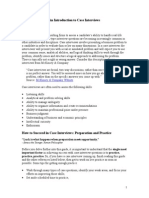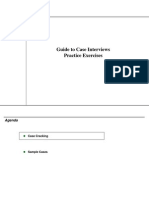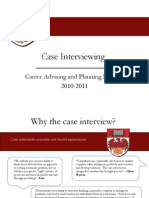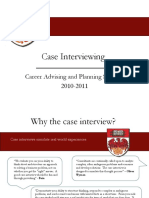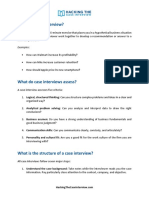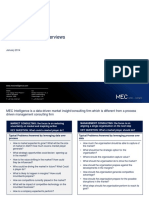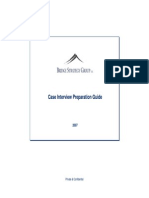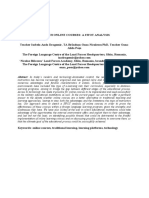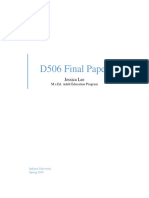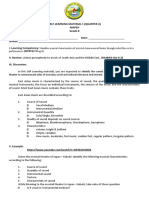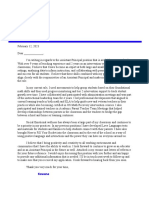A Guide to Interviewing at Inductis
www.inductis.com
�2
What We Look For
Analytic and Quantitative Skills Communication Skills Leadership Ability
Characteristics
Teamwork
Organization
Ethics and Integrity
Computer Skills
�3
Our Interviews
Typically each interview is a mix of a fit interview and a case interview. To receive an offer you must succeed in both
Fit
Offer
Case
�4
The Fit Interview: Overview
The main purpose of the fit interview is to discover whether you will "fit" with the firm's culture and people
To explore your personal integrity and ambitions To learn about your interests and to see if they match those of the firm Objectives To see whether you can "present" yourself in a coherent manner To ascertain your level of knowledge and interest in consulting To provide an opportunity for you to learn more about our firm
�5
Typical Questions to Expect
Tell me something about yourself
Give me an instance when you performed under stress
Give me an instance where you have delivered a creative solution. What was the impact of your solution?
Tell me an incident where your views were in conflict with team. How did you resolve?
�6
The Dos and Donts of a Fit Interview
Since the fit interview is designed to see simply if you match well with the firm, it is difficult to put forth a set of rules. However, there are some basic dos and don'ts DO: DON'T: Relax and be comfortable Get defensive or let nerves overcome Express your own interests and you expectations Feign interest in subjects to impress Convey a coherent picture of yourself the interviewer and your skills Tell stories that confuse the interviewer Ask good questions or provide confusing images of who Demonstrate your knowledge of the firm you are (i.e. its culture and history) Ask questions for the sake of asking questions Appear ignorant about the position for which you are interviewing or about the firm with which you are interviewing
�7
The Case Interview: Overview
Case interviews seem to be one of the biggest sources of stress surrounding the interviewing process, but they don't need to be. If you understand what the interviewer is looking for, case interviews can be quite manageable
To ascertain how you think through problems
Objectives
To determine your ability to structure a logical argument
To test your analytic and quantitative skills
To give you a flavor for the types of problems consultants work on
�8
General Hints for Approaching Cases
No matter what kind of case you face, there are a few guidelines you should always keep in mind Think first, then speak Be as clear and concise as possible (e.g. 1, 2, 3) Ask questions, don't just give answers Make sure you are answering the problem being asked Establish the scope of the problem before digging deep in one area Always state your assumptions Don't be afraid to take notes if there are a lot of facts Be sure you explain your thought process/logic path Select a solution and justify it Don't forget possible alternatives Read the newspaper the day of your interview; many times interviewers will pull their cases from the day's news
�9
Basic US Statistics
While you certainly shouldn't go and memorize the census report, there are certain statistics that you should be familiar with in order to help you solve cases. You should also be familiar with general demographic trends (i.e. Gen-Xers vs. Baby-Boomers and income distribution)
Population of the World: 6.2 billion
Population of the U.S.: 290 million
Number of US Households: 105 million
Number of adults in the US: 210 million (18+ yrs.) 200 million (25+ yrs.)
Number of Cars per Household: 2.5
Minimum Wage: approx. $5 per hour
�10
Interviewing Styles
Every interviewer will have a different interview style. When explaining a case you must feel comfortable with each of the different approaches and be able to adapt your approach
Case Descriptions
Detailed Problem Detailed introduction of case Specific problem to be solved A few starter facts Many additional facts available, if asked Conversational feel throughout case interview Conceptual Problem
Two Extremes
Brief introduction Very broad description of problem (e.g. poor performance) Few, if any facts available What do you think responses to many questions
�11
Types of Cases
The types of cases you are likely to encounter will generally fit into one of three distinct groups
Strategy Types of Cases
Brain-Teasers
Special Cases Engineering Economics Data Analytics Puzzles Miscellaneous
�12
Strategy Cases
Strategy cases generally involve one or more of the following three issues, but these certainly do not represent the universe of possible scenarios Types of Strategy Cases
Costs
Marketing
Revenues
�13
Frameworks for Approaching Strategy Cases: The Four Ps
While you probably do not want to make it obvious that you are using an economic framework to solve a case, employing the underlying logic should help you structure your argument and solidify your analysis. One popular framework is the Four P's: Product
What product do you want to sell? What product are you able to produce? What advantages does your product offer? What price must you charge to make a profit? What price are consumers willing to pay? What price are your competitors charging? Where is there a demand for your product? Where are your suppliers located? What distribution channels are being used? Who is your target audience? How do you reach them? How much do you want to spend on promotions and advertising?
Price The Four P's Place
Promotion
�14
Frameworks for Approaching Strategy Cases: The Four Cs
Another helpful framework in approaching a strategy case is the Four C's:
What do the customers want and need? How will you satisfy those needs? What is most important to the customers? How much will they pay for it? What are your competitors doing? What are their strengths and weaknesses? How are they meeting the customer's demand? What is their cost structure? What are your company's capacities: - financial - organizational - production - marketing? What are your strengths and weaknesses? What is your cost structure? - fixed costs - variable costs How have your costs changed over time?
Customers
Competitors
The Four C's Capacity
Costs
�15
Framework for Approaching Strategy Cases: Marketing Strategy Model
While it is slightly more complex than the previous frameworks, the marketing strategy model provides an excellent frame of reference for marketing cases
What are the costs? What is the break even? How long is the payback on my investment?
Start Economics Consumer Analysis
What is the relevant market? Who is buying and who is using the product? What is the buying process? How can I segment the market?
How does my product fit with my other products? How will I differentiate my product? How does the product life cycle affect my plans?
Marketing Mix
Distribution
Competition
How can my product reach the consumer? How much do the players in each distribution channel profit? Who holds the power in each distribution channel available?
What are your company's strengths and weaknesses? What are your competitor's strengths and weaknesses? What is your relative size and position in the market? How do your resources differ from those of your competitors?
�16
Brainteasers and Special Cases
Brain Teasers and Special Cases are meant to test the following
Ability to breakdown a complex problem into simple steps Conceptual reasoning skills Logical reasoning Quantitative skills Basic Economics Knowledge Basic Engineering Knowledge Creativity
�17
If You Get In a Jam
Pause to collect your thoughts. Remaining silent is better than blurting out an incoherent thought
Recount what you already know to the interviewer. By reviewing what you know about the case, the next step often becomes more clear
Don't give up. Interviewers are judging your poise and maturity in addition to your problem-solving skills
�18
Thank-you for applying to Inductis. We look forward to meeting you through the interview process. Additional information on the company can be found on our website: www.inductis.com
